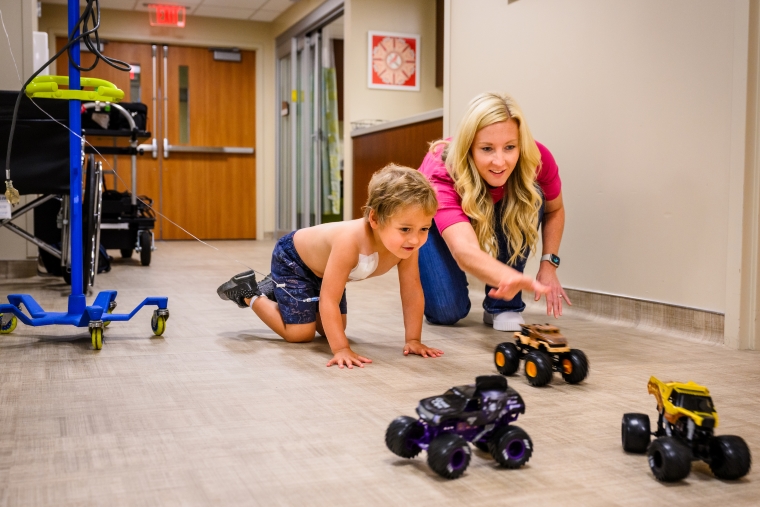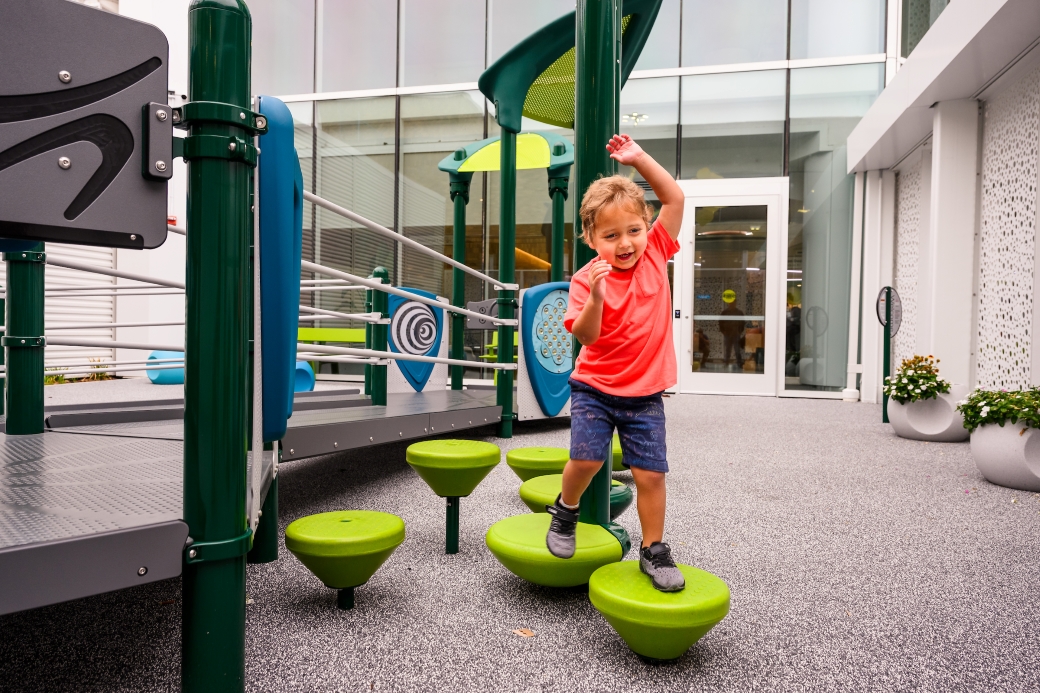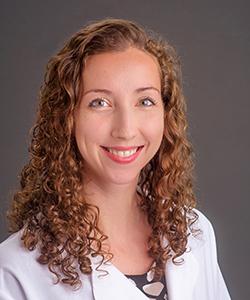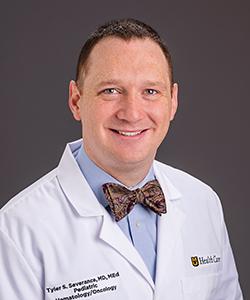It’s hard to imagine a force strong enough to slow down Bennett Stone.
Whether he’s scootering, kicking a soccer ball, playing with his toy trucks, laughing on the swing set or digging in the dirt and sand at the park with his older brother, he’s going at full speed with a gleam in his eye.
That joyful, rewarding exhaustion makes slower evenings at home, reading “Chicka Chicka Boom Boom” or “Green Eggs and Ham,” even better for his parents, Tara and Fred.
“Those special quiet moments where your kid comes and cuddles up to you at night and asks you to read them a book, those are the biggest blessings and biggest privileges,” Tara said.
Bennett was born prematurely, at 28 and a half weeks. MU Health Care pediatric pulmonologist Rebekah Nevel, MD, joined his care team because premature babies are more likely to develop lung and breathing issues.
On his third birthday, Bennett came to Children’s Hospital because of a viral asthmatic episode. In the hospital, Dr. Nevel noted his recurrent fevers and referred the Stones to pediatric infectious diseases specialist Amruta Padhye, MD. Bennett went home feeling better but got sick shortly after and was prescribed steroids.
One of those slow nights at home, while waiting for the steroids to clear his system so he could receive follow-up tests, Bennett went to sleep next to mom. She noticed a strange sound when he breathed, recorded it and sent it to his doctors through the online patient portal.
Dr. Nevel and Dr. Padhye listened to Bennett’s breathing and quickly scheduled a CT scan. Dr. Padhye helped fast-track the insurance approvals to make sure he was seen as soon as possible.
“That next week we came up for a CT scan, and that was the day we didn’t go home,” Tara said. “We made it to the parking lot, and they gave me a call. ‘Hey, can you come back and discuss the results?’”
The CT scan showed a mass in Bennett’s chest. A biopsy confirmed it was acute T-cell lymphoblastic leukemia that had spread to his lymph nodes. Pediatric hematologist and oncologist Tyler Severance, MD, sat down with Tara and Bennett. Fred, who was home in Rolla watching their older son, joined via FaceTime.
“That call is etched in my mind as something I won’t forget,” Fred said. “At that point, it was head up to Columbia to get things figured out and take those next steps.”
T-cell leukemia is a bone marrow cancer that disrupts your body’s ability to make healthy T cells. These cells are a key part of your immune system, which helped explain why Bennett was sick so often.
“For Bennett in particular, one of the things that was affected were the lymph nodes in his chest,” Severance said. “And when I think of his initial days when we were first getting to know Bennett, I'm reminded of how sick he was and how scary his initial presentation was because the lymph nodes in his chest were so large, they threatened his ability to breathe safely.” Working together, Dr. Nevel, Dr. Padhye, Dr. Severance, Kim Ebersol, PNP and the pediatric oncology nurses and support staff created a careful approach to treat Bennett’s cancer.
“I’m pretty analytical, and in the first two weeks I must have asked a million questions,” Fred said. “Dr. Severance and Kim always took the time to answer and cared about our concerns. Their patience was incredible, and, after we left the hospital, we always had an email address for non-urgent questions and an after-hours phone number if we needed.”
Despite everything that went into his diagnosis and initial care plan, the Stones will always thank the Child Life team for making sure Bennett was able to get his diagnostic CT scan.
“I love to give Child Life credit because we were running late for that initial CT scan due to a miscommunication and Bennett was tapped out,” Tara said. “He wouldn’t listen to mom, and Child Life came in, calmed him down and got him having fun. If it wasn’t for them in that moment, I don’t know we would have completed the CT scan and discovered his cancer when we did.”
Bennett started inpatient chemotherapy with steroids. Before doing outpatient infusions, he went through weeks of high-dose steroid treatment to help his body prepare for the difficult cancer treatment he needed. The steroids dramatically changed his appetite, and Tara would push Bennett in his stroller for miles to get him thinking about something other than food.
Once his chemotherapy started, even at his sickest, Bennett was still active and running around the unit. He was slowed only by his medical IV pole, which he named “Mr. Poley.”

“He does not slow down for anything,” Severance said. “Even if he is actively getting chemotherapy infused through his port, he is still running around clinic too fast for his own good, he'll just run, run, run, run nonstop. His energy reserve and his positivity are so impressive, he will engage and smile and befriend every single person that he meets.”
Bennett’s energy during treatment to kick a soccer ball in the hall with his nurses and parents, or laugh while pushing around toy trucks, is not something Tara takes for granted.
“When you see your child being happy, strong, brave and joyful, you feel like you have to rise to that same level,” Tara said. “Even in the most challenging experience of his life he held onto his joy, and his strength became my strength. It completely shifts your perspective.”
Bennett responded well to treatment, and his care team saw his cancer had run out of energy a few months after he started chemotherapy. He still needs routine monitoring and two more years of maintenance treatments, but Bennett is doing great and hasn’t seemed to slow down at all.
Tara talks him through nightly affirmations, one of which is that each illness he faces is just a speed bump.
“The second is, I know this is hard, but you are strong, and you can do hard things,” Tara said. “He is strong and brave, and my hope is that he will continue to grow, stay healthy and not let the weight of cancer hold him back. I truly believe he’s destined to do great things.”






